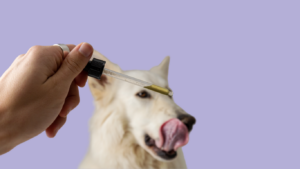Having a nervous or anxious dog can be tough. They might bark a lot, hide, or even act out. But
don’t worry, there are easy ways to help your furry friend feel better. Let’s dive into five of them.
Understanding Dog Anxiety and How to Help Your Furry Friend
If you’re a dog owner, you’ve probably seen your dog show signs of nervousness or anxiety at some point. Maybe they bark excessively, shake during thunderstorms, or hide when there are a lot of people around. Anxiety in dogs is more common than you might think, and it can be triggered by many things like loud noises, new environments, or separation from their owners.
An anxious dog isn’t just uncomfortable – their stress can affect their health and behavior. But here’s the good news: there are many ways to help your dog feel more relaxed and secure. In this blog, we’ll explore simple, effective methods to calm your anxious dog. From exercise to creating a safe space, these strategies are not only easy to implement but also make a significant difference in your dog’s well-being. Plus, we’ll touch on the growing interest in using CBD as a potential aid for anxiety in dogs.

Remember, every dog is unique, so what works for one might not work for another. It’s all about understanding your dog’s specific needs and trying out different methods to see what helps them the most. Let’s explore these calming strategies to find the best way to support your furry friend in their anxious moments.
1. Exercise: A Key to Easing Dog Anxiety
Exercise is not just about keeping your dog physically fit; it plays a crucial role in managing anxiety. When dogs are regularly active, they burn off energy that might otherwise fuel anxious behaviors. Here’s how exercise can make a big difference:
- Stress Relief: Physical activity increases the production of feel-good chemicals in the brain, like endorphins. Just like in humans, these chemicals can help dogs feel more relaxed and happy.
- Routine and Predictability: Dogs love routine. Having regular exercise times can provide a sense of predictability and security, which is especially comforting for anxious dogs.
- Distraction: Exercise provides a healthy distraction from stressors. Whether it’s a game of fetch or a brisk walk, focusing on physical activity can take your dog’s mind off things that make them anxious.
- Socialization Opportunities: For some dogs, anxiety stems from unfamiliarity with other
dogs or people. Exercise, especially in public places like parks, can be a great opportunity for controlled socialization. - Tiring Them Out: An old saying goes, “A tired dog is a good dog.” This is particularly true for anxious dogs. After a good exercise session, they’re more likely to be calm and less inclined to engage in anxious behaviors.
2. Music: The Soothing Power of Sound for Anxious Dogs
Music can have a surprisingly calming effect on dogs, much like it does for humans. It’s a simple, non-invasive way to help ease your dog’s anxiety. Here’s how music can be a soothing balm for your furry friend:
- The Right Type of Music: Not all music is equal in the eyes (or ears) of a dog. Classical music, soft rock, and some types of jazz are known to be particularly calming for dogs.
- Reduces Reaction to Stressful Stimuli: Music can help drown out or soften noises that might otherwise cause anxiety in dogs.
- Creating a Relaxing Environment: Playing music can create a peaceful and familiar environment in your home.
- Consistency is Key: Playing the same type of music regularly during stressful times can help your dog associate those sounds with relaxation and safety.
3. CBD: A Potential Natural Remedy for Dog Anxiety
CBD (Cannabidiol) is a compound found in cannabis and hemp plants. In recent years, it has gained attention as a potential natural remedy for anxiety in dogs. Here’s what you should know about using CBD to help calm your anxious dog:
- How CBD Works: CBD is believed to interact with a dog’s endocannabinoid system, which helps maintain balance in the body and can affect mood, pain, and relaxation.
- Research and Evidence: Research on CBD for dogs is still in its early stages, but some studies and anecdotal evidence suggest it can help reduce anxiety.
- Consulting a Veterinarian: Before starting any new treatment, including CBD, it’s crucial to talk with your veterinarian.
- Choosing the Right Product: Look for high-quality CBD products specifically designed for pets.
4. Safe Spaces: Creating a Comfort Zone for Anxious Dogs
Creating a safe space for your dog can be a game changer in managing their anxiety. Dogs, much like humans, need a place where they can retreat and feel secure. Here’s how you can create such a space and why it’s beneficial:
- Understanding the Need for a Safe Space: Dogs often seek a haven when they feel overwhelmed, scared, or anxious.
- Choosing the Right Location: The ideal safe space is a quiet, somewhat secluded area in your home.
- Making It Comfortable: Equip this area with a cozy bed or blankets, some of your dog’s favorite toys, and perhaps an item with your scent on it for added comfort.
5. Patience and Understanding in Easing Dog Anxiety
Helping an anxious dog isn’t an overnight fix; it’s a journey that requires patience, understanding, and consistency. As you try out the methods we’ve discussed, remember that each dog is unique. What calms one dog might not work for another, so it’s important to be observant and responsive to your dog’s individual needs.
- Combine Methods: Often, using a combination of strategies like exercise, music, and a safe space works better than relying on just one method.
- Continuous Monitoring and Adjustment: Keep an eye on how your dog responds to different calming methods and be ready to adjust your approach accordingly.
- Professional Guidance: If your dog’s anxiety is severe or if you’re not seeing improvements, it’s important to consult with a veterinarian or an animal behaviorist.
Remember, the goal is to make your dog’s life as stress-free and happy as possible. With your care and attention, anxious behaviors can be managed and even overcome. As a dog owner, your support and love are the most powerful tools in your arsenal. Keep striving to understand and help your furry friend, and with time, you’ll likely see a happier, more relaxed dog.
Stay tuned to our blog for more insights and tips on pet care. We’re here to help you and your dog enjoy a wonderful life together!

